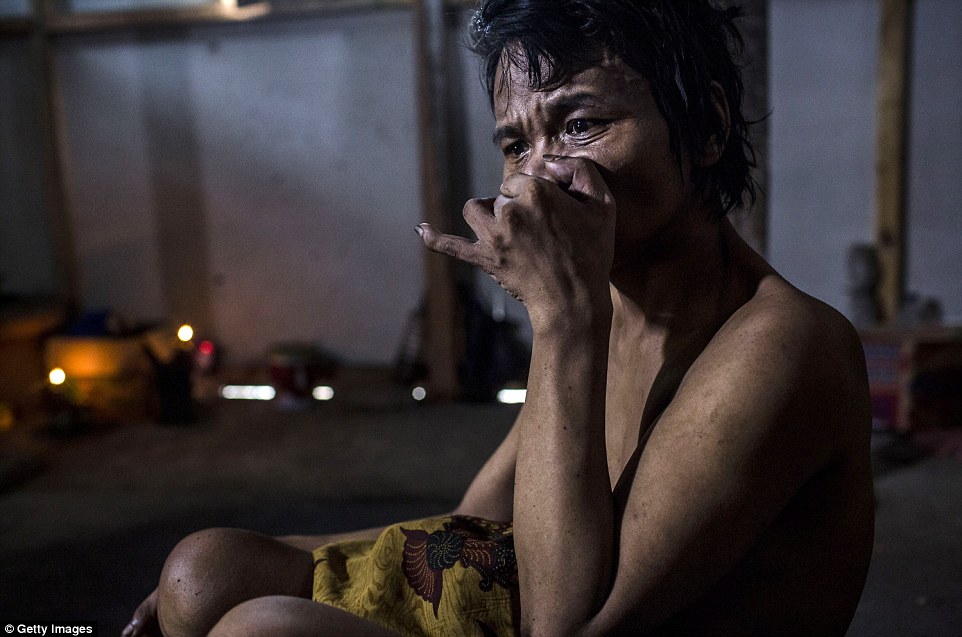Village of the damned: Hundreds of mentally ill patients are shackled or locked away in Indonesian village where their suffering is blamed on 'incest and malnutrition'
- People ranging in age from 10 to 50 are shackled to the floor in Sidoharjo, Karangpatihan and Krebet in Indonesia
- They suffer from severe physical retardation, also known as 'Kampung Idiot', which is akin to Down Syndrome
- Over 400 people suffer from psychosocial disabilities in Ponorogo, East Java - and many live below the poverty line
- Government officials and villagers blame incest, malnutrition and iodine deficiency as the cause for the illness
This is the harrowing Indonesian village where people with mental illnesses are shackled to the floor and locked up in dark, cell-like rooms.
In Sidoharjo, Karangpatihan and Krebet, both adolescents and adults suffer from severe physical retardation, also known as 'Kampung Idiot', which is comparable to Down's Syndrome.
The horrifying images show a 40-year-old woman called Sijum with Down's Syndrome lying immobile on her back as her mother spoon-feeds her, while Saimun, 45, sits on the ground in his house, where his legs have been chained for 20 years by his parents because he suffers from mental illness.
These victims live below the poverty line and many suffer from malnutrition, visual and hearing impairment - but villagers and government officials blame incest, malnutrition and iodine deficiency as the cause for their illness.

Sinem, who suffers from Down's Syndrome, sits on the dank, wet floor of her house in Krebet Village in Jambon subdistrict of Indonesia

Bosmot, 55, suffers from Down's Syndrome - government officials blame incest, malnutrition and iodine deficiency as the cause for the illness

Sinem, clad in a tattered shirt and shorts sits barefoot in the dirt of a dark, squalid room in the village of Krebet

Saimun, 45, lies on the ground inside his house, where his legs have been chained for 20 years by his parents because he suffers from mental illness
More than 400 people suffer from psychosocial disabilities in Ponorogo, East Java, and live in squalid conditions, with their family earning between 30 to 50 U.S. dollars per month.
A common practice in these villages was to keep those with psychosocial disabilities under pasung - shackled or locked up. Indonesia's government banned the practice of shackling in 1977 but failed to enforce it.
According to Human Rights Watch, more than 57,000 people have been subjected to pasung once in their lives and around 18,800 are currently being shackled.
Thousands of Indonesians with a mental illness are currently shackled, according to a Human Rights Watch (HRW) report released on Monday.
The 74-page report, 'Living in Hell: Abuses against People with Psychosocial Disabilities in Indonesia' examines how people with mental health conditions often end up chained or locked up in overcrowded and unsanitary institutions.
Chaining up the mentally ill has been illegal in Indonesia for nearly 40 years but remains rife across the country, especially in rural areas where health services are limited and belief in evil spirits prevail, according to HRW.

Suhananto, 30, sits inside a cage, where he has been locked up in a confined space for a year by his parents because he suffers from mental illness

Legi, and her brother Saremon, who both suffer from Down Syndrome, are kept under 'pasung' - either shackled or locked up

Simus is a 60-year-old Down's Syndrome sufferer, crouches in his dark house which is laden with threadbare rugs and bamboo thatching in Krebet Village

Dwi Sarnawati, 19, who suffers from Down's Syndrome, is one of many victims living below the poverty line with their family earning between 30 to 50 U.S. dollars per month

Gondek 50, who suffers from Down's Syndrome, cleans up leftover paddy collected from the harvest at Krebet village in Jambon subdistrict
'Nobody should have to be shackled in Indonesia in 2016 - people told us again and again that it's like living in hell,' Kriti Sharma, disability rights researcher at the group and author of the report, told AFP.
As well as shackling, the report listed a litany of other abuses the mentally ill face in Indonesia - sexual violence, electroshock therapy, and restraint and seclusion in often overcrowded, unsanitary institutions.
There are just 48 mental hospitals in Indonesia, a country of 250 million, most of them in urban areas.
Treatment options are scarce for the millions living in remote regions, leaving desperate families to turn to faith healers in the Muslim-majority nation, some of whom chain up patients.

Sati, 39, who suffers from Down's Syndrome, takes a bath assisted by her mother in her house. Many of the victims suffer from malnutrition, visual and hearing impairment

Jamila, 13, who suffers from Down's Syndrome, lies on blue tarpualin spread out inside a house at Sidowayah village in Jambon subdistrict

Saimun, 45, lies on the ground inside his house, where his legs have been chained for 20 years by his parents because he suffers from mental illness
HRW - who interviewed around 150 people for their report, from the mentally ill to health professionals - said there are currently almost 19,000 people in Indonesia who are either shackled or locked up in a confined space, a practice known locally as 'pasung'.
At least 14 million people in Indonesia aged 15 and over are thought to be suffering from some form of mental illness, according to health ministry data.
Shackling of mentally ill people happens across Asia but is particularly common in Indonesia, with studies showing that it is due to poor mental health services in rural areas and a lack of knowledge about suitable treatments.
Families that choose not to send mentally ill relatives to faith healers sometimes take matters into their own hands.

Andika, 17, who suffers from Down's Syndrome, takes a bath assisted by his mother Supini at Sidoarjo village

Faiz, who is only 10, suffers from Down's Syndrome and is assisted by his mother Tumini, inside their house

Faiz is pictured lying spreadeagled on filthy-looking bed sheets - Indonesia's government banned the practice of shackling in 1977 but failed to enforce it

Chaining up the mentally ill has been illegal in Indonesia for nearly 40 years but still happens across the country, especially in rural areas where health services are limited and belief in evil spirits prevail, according to Human Rights Watch (pictured Andika, 17, who has Down's Syndrome, plays with his mother Supini)

Sijum, 40, who suffers from Down syndrome, lies immobile on her back as her mother Toyimah spoons food into her mouth

There are just 48 mental hospitals in Indonesia, a country of 250 million, most of them in urban areas. Treatment options are scarce for the millions living in remote regions, leaving desperate families to turn to faith healers in the Muslim-majority nation (pictured 50-year-old Gondek)
-
 Sanitation worker Nelson Molina shows off his collection
Sanitation worker Nelson Molina shows off his collection
-
 Disturbing final moments of IS fighter who GoPros his own...
Disturbing final moments of IS fighter who GoPros his own...
-
 PEZ Easter egg hunt turns to chaos as crowds swarm the field
PEZ Easter egg hunt turns to chaos as crowds swarm the field
-
 Hugh Jackman helps his son and others out of a rip at Bondi
Hugh Jackman helps his son and others out of a rip at Bondi
-
 Biker gang rides down 2nd Avenue in Manhattan
Biker gang rides down 2nd Avenue in Manhattan
-
 Police release CCTV of Brussels airport bombing suspect
Police release CCTV of Brussels airport bombing suspect
-
 Eleven-year-old Jessi Slaughter appears in infamous video
Eleven-year-old Jessi Slaughter appears in infamous video
-
 University of Michigan frat boy filmed harassing Uber driver
University of Michigan frat boy filmed harassing Uber driver
-
 Abdeslam brothers dance to rapper Lacrim in Brussels night...
Abdeslam brothers dance to rapper Lacrim in Brussels night...
-
 Ivanka Trump & husband out for a walk hours before giving...
Ivanka Trump & husband out for a walk hours before giving...
-
 Meet the Donald Trump impersonator who's making $40k a...
Meet the Donald Trump impersonator who's making $40k a...
-
 Jessica Lowndes woken up by new 'bae' Jon Lovitz
Jessica Lowndes woken up by new 'bae' Jon Lovitz
-
 ISIS 'crucifies Catholic priest on Good Friday' after...
ISIS 'crucifies Catholic priest on Good Friday' after...
-
 Pictured: Tennessee PASTOR who was shot by police when he...
Pictured: Tennessee PASTOR who was shot by police when he...
-
 It's a boy! Ivanka Trump gives birth to baby boy with a very...
It's a boy! Ivanka Trump gives birth to baby boy with a very...
-
 Marauding parents in Easter Egg hunt rampage: Out-of-control...
Marauding parents in Easter Egg hunt rampage: Out-of-control...
-
 Kremlin 'braced for expose on Putin's alleged secret...
Kremlin 'braced for expose on Putin's alleged secret...
-
 Garry Shandling's friends gather at his LA home for one last...
Garry Shandling's friends gather at his LA home for one last...
-
 EXCLUSIVE: 'I have breast cancer.' Courageous supermodel...
EXCLUSIVE: 'I have breast cancer.' Courageous supermodel...
-
 Indiana man, 22, charged with kidnapping, raping and...
Indiana man, 22, charged with kidnapping, raping and...
-
 Village of the damned: Hundreds of mentally ill patients are...
Village of the damned: Hundreds of mentally ill patients are...
-
 Illegal dirt bike gang parades down the streets of New York...
Illegal dirt bike gang parades down the streets of New York...
-
 Ex-Victoria's Secret model 'beat businessman she met on...
Ex-Victoria's Secret model 'beat businessman she met on...
-
 'Bush did 9/11 but he did me a solid and left me a hella...
'Bush did 9/11 but he did me a solid and left me a hella...




























This article is terrible. For all the wrong reasons...
by bradshaw91 1164